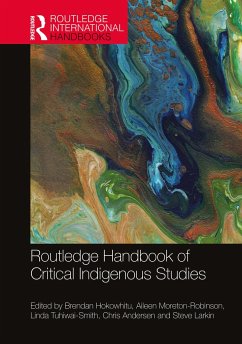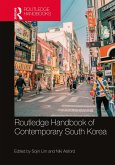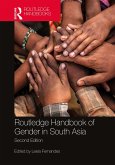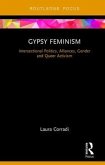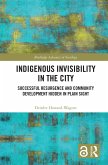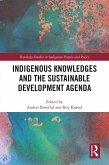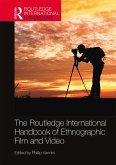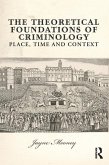Routledge Handbook of Critical Indigenous Studies
Herausgeber: Hokowhitu, Brendan; Tuhiwai-Smith, Linda; Moreton-Robinson, Aileen
Routledge Handbook of Critical Indigenous Studies
Herausgeber: Hokowhitu, Brendan; Tuhiwai-Smith, Linda; Moreton-Robinson, Aileen
- Gebundenes Buch
- Merkliste
- Auf die Merkliste
- Bewerten Bewerten
- Teilen
- Produkt teilen
- Produkterinnerung
- Produkterinnerung
This handbook is the first comprehensive overview of the rapidly expanding field of indigenous scholarship. The book is ambitious in scope, ranging across disciplines and national boundaries, with particular reference to the lived conditions of Indigenous peoples in the first world.
Andere Kunden interessierten sich auch für
![Routledge Handbook of Contemporary South Korea Routledge Handbook of Contemporary South Korea]() Routledge Handbook of Contemporary South Korea303,99 €
Routledge Handbook of Contemporary South Korea303,99 €![Routledge Handbook of Gender in South Asia Routledge Handbook of Gender in South Asia]() Routledge Handbook of Gender in South Asia271,99 €
Routledge Handbook of Gender in South Asia271,99 €![Gypsy Feminism Gypsy Feminism]() Laura CorradiGypsy Feminism74,99 €
Laura CorradiGypsy Feminism74,99 €![Indigenous Invisibility in the City Indigenous Invisibility in the City]() Deirdre Howard-WagnerIndigenous Invisibility in the City195,99 €
Deirdre Howard-WagnerIndigenous Invisibility in the City195,99 €![Indigenous Knowledges and the Sustainable Development Agenda Indigenous Knowledges and the Sustainable Development Agenda]() Indigenous Knowledges and the Sustainable Development Agenda195,99 €
Indigenous Knowledges and the Sustainable Development Agenda195,99 €![The Routledge International Handbook of Ethnographic Film and Video The Routledge International Handbook of Ethnographic Film and Video]() The Routledge International Handbook of Ethnographic Film and Video303,99 €
The Routledge International Handbook of Ethnographic Film and Video303,99 €![The Theoretical Foundations of Criminology The Theoretical Foundations of Criminology]() Jayne MooneyThe Theoretical Foundations of Criminology196,99 €
Jayne MooneyThe Theoretical Foundations of Criminology196,99 €-
-
-
This handbook is the first comprehensive overview of the rapidly expanding field of indigenous scholarship. The book is ambitious in scope, ranging across disciplines and national boundaries, with particular reference to the lived conditions of Indigenous peoples in the first world.
Hinweis: Dieser Artikel kann nur an eine deutsche Lieferadresse ausgeliefert werden.
Hinweis: Dieser Artikel kann nur an eine deutsche Lieferadresse ausgeliefert werden.
Produktdetails
- Produktdetails
- Verlag: Routledge
- Seitenzahl: 634
- Erscheinungstermin: 31. Dezember 2020
- Englisch
- Abmessung: 250mm x 175mm x 38mm
- Gewicht: 1257g
- ISBN-13: 9781138341302
- ISBN-10: 1138341304
- Artikelnr.: 59996668
- Herstellerkennzeichnung
- Libri GmbH
- Europaallee 1
- 36244 Bad Hersfeld
- gpsr@libri.de
- Verlag: Routledge
- Seitenzahl: 634
- Erscheinungstermin: 31. Dezember 2020
- Englisch
- Abmessung: 250mm x 175mm x 38mm
- Gewicht: 1257g
- ISBN-13: 9781138341302
- ISBN-10: 1138341304
- Artikelnr.: 59996668
- Herstellerkennzeichnung
- Libri GmbH
- Europaallee 1
- 36244 Bad Hersfeld
- gpsr@libri.de
Brendan Hokowhitu is Ng¿ti Pukenga, Dean and Professor, Faculty of M¿ori and Indigenous Studies, University of Waikato, Aotearoa New Zealand. Aileen Moreton-Robinson is a Goenpul woman of Quandamooka (Moreton Bay, Australia) and a Distinguished Professor of Indigenous Research, Office of Indigenous Education and Engagement Policy, Strategy and Impact, RMIT University. Linda Tuhiwai-Smith is Ng¿ti Awa, Ng¿ti Porou, Tuhourangi, and Professor of M¿ori and Indigenous Studies, Faculty of M¿ori and Indigenous Studies, University of Waikato, Aotearoa New Zealand. Chris Andersen is Métis and Dean of the Faculty of Native Studies, University of Alberta, Canada. Steve Larkin is Chief Executive Officer at the Batchelor Institute of Indigenous Tertiary Education, Australia.
List of figures List of contributors Acknowledgements Introduction PART 1 Disciplinary knowledge and epistemology 1 The institutional and intellectual trajectories of Indigenous Studies in North America: Harnessing the 'NAISA Effect' 2 Ricochet: It's not where you land; it's how far you fly 3 Multi-generational Indigenous feminisms: From F word to what IFs 4 Against crisis epistemology 5 Matariki and the decolonisation of time 6 Indigenous women writers in unexpected places 7 Critical Indigenous methodology and the problems of history: Love and death beyond boundaries in Victorian British Columbia 8 Decolonising psychology: Self-determination and social and emotional well-being 9 Colours of creation PART 2 Indigenous theory and method 10 The emperor's 'new' materialisms: Indigenous materialisms and disciplinary colonialism 11 Intimate encounters Aboriginal labour stories and the violence of the colonial archive 12 M
ku An
e Hanga T
ku Nei Whare: I myself shall build my house 13 On the politics of Indigenous translation: Listening to Indigenous peoples in and on their own terms 14 Auntie's bundle: Conversation and research methodologies with Knowledge Gifter Sherry Copenace 15 When nothingness revokes certainty: A M
ori speculation 16 Vital earth/vibrant earthworks/living earthworks vocabularies 17 "To be a good relative means being a good relative to everyone": Indigenous feminisms is for everyone 18 'Objectivity' and repatriation: Pulling on the colonisers' tale PART 3 Sovereignty 19 Incommensurable sovereignties: Indigenous ontology matters 20 Mana M
ori motuhake: M
ori concepts and practices of sovereignty 21 He Ali
i Ka
ina, Ua Mau Kona Ea: Land is the chief, long may she reign 22 Relational accountability in Indigenous governance: Navigating the doctrine of distrust in the Osage Nation 23 Ellos Deatnu and post-state Indigenous feminist sovereignty 24 Striking back: The 1980s Aboriginal art movement and the performativity of sovereignty 25 Communality as everyday Indigenous sovereignty in Oaxaca, Mexico 26 American Indian sovereignty versus the United States PART 4 Political economies, ecologies, and technologies 27 A story about the time we had a global pandemic and how it affected my life and work as a critical Indigenous scholar 28 Once were Maoists: Third World currents in Fourth World anticolonialism, Vancouver, 1967-1975 29 Resurgent kinships: Indigenous relations of well-being vs. humanitarian health economies 30 Indigenous environmental justice: Towards an ethical and sustainable future 31 Diverse Indigenous environmental identities: M
ori resource management innovations 32 The ski or the wheel?: Foregrounding Sámi technological Innovation in the Arctic region and challenging its invisibility in the history of humanity 33 The Indigenous digital footprint PART 5 Bodies, performance, and praxis 34 Identity is a poor substitute for relating: Genetic ancestry, critical polyamory, property, and relations 35 Indigeneity and performance 36 Indigenous insistence on film 37 The politics of language in Indigenous cinema 38 Entangled histories and transformative futures: Indigenous sport in the 21st century 39 Raranga as healing methodology: Body, place, and making 40 Becoming knowledgeable: Indigenous embodied praxis 41 Nyuragil - playing the 'game' 42 Academic and STEM success: Pathways to Indigenous sovereignty 43 Aboriginal child as knowledge producer: Bringing into dialogue Indigenist epistemologies and culturally responsive pedagogies for schooling
ku An
e Hanga T
ku Nei Whare: I myself shall build my house 13 On the politics of Indigenous translation: Listening to Indigenous peoples in and on their own terms 14 Auntie's bundle: Conversation and research methodologies with Knowledge Gifter Sherry Copenace 15 When nothingness revokes certainty: A M
ori speculation 16 Vital earth/vibrant earthworks/living earthworks vocabularies 17 "To be a good relative means being a good relative to everyone": Indigenous feminisms is for everyone 18 'Objectivity' and repatriation: Pulling on the colonisers' tale PART 3 Sovereignty 19 Incommensurable sovereignties: Indigenous ontology matters 20 Mana M
ori motuhake: M
ori concepts and practices of sovereignty 21 He Ali
i Ka
ina, Ua Mau Kona Ea: Land is the chief, long may she reign 22 Relational accountability in Indigenous governance: Navigating the doctrine of distrust in the Osage Nation 23 Ellos Deatnu and post-state Indigenous feminist sovereignty 24 Striking back: The 1980s Aboriginal art movement and the performativity of sovereignty 25 Communality as everyday Indigenous sovereignty in Oaxaca, Mexico 26 American Indian sovereignty versus the United States PART 4 Political economies, ecologies, and technologies 27 A story about the time we had a global pandemic and how it affected my life and work as a critical Indigenous scholar 28 Once were Maoists: Third World currents in Fourth World anticolonialism, Vancouver, 1967-1975 29 Resurgent kinships: Indigenous relations of well-being vs. humanitarian health economies 30 Indigenous environmental justice: Towards an ethical and sustainable future 31 Diverse Indigenous environmental identities: M
ori resource management innovations 32 The ski or the wheel?: Foregrounding Sámi technological Innovation in the Arctic region and challenging its invisibility in the history of humanity 33 The Indigenous digital footprint PART 5 Bodies, performance, and praxis 34 Identity is a poor substitute for relating: Genetic ancestry, critical polyamory, property, and relations 35 Indigeneity and performance 36 Indigenous insistence on film 37 The politics of language in Indigenous cinema 38 Entangled histories and transformative futures: Indigenous sport in the 21st century 39 Raranga as healing methodology: Body, place, and making 40 Becoming knowledgeable: Indigenous embodied praxis 41 Nyuragil - playing the 'game' 42 Academic and STEM success: Pathways to Indigenous sovereignty 43 Aboriginal child as knowledge producer: Bringing into dialogue Indigenist epistemologies and culturally responsive pedagogies for schooling
List of figures List of contributors Acknowledgements Introduction PART 1 Disciplinary knowledge and epistemology 1 The institutional and intellectual trajectories of Indigenous Studies in North America: Harnessing the 'NAISA Effect' 2 Ricochet: It's not where you land; it's how far you fly 3 Multi-generational Indigenous feminisms: From F word to what IFs 4 Against crisis epistemology 5 Matariki and the decolonisation of time 6 Indigenous women writers in unexpected places 7 Critical Indigenous methodology and the problems of history: Love and death beyond boundaries in Victorian British Columbia 8 Decolonising psychology: Self-determination and social and emotional well-being 9 Colours of creation PART 2 Indigenous theory and method 10 The emperor's 'new' materialisms: Indigenous materialisms and disciplinary colonialism 11 Intimate encounters Aboriginal labour stories and the violence of the colonial archive 12 M
ku An
e Hanga T
ku Nei Whare: I myself shall build my house 13 On the politics of Indigenous translation: Listening to Indigenous peoples in and on their own terms 14 Auntie's bundle: Conversation and research methodologies with Knowledge Gifter Sherry Copenace 15 When nothingness revokes certainty: A M
ori speculation 16 Vital earth/vibrant earthworks/living earthworks vocabularies 17 "To be a good relative means being a good relative to everyone": Indigenous feminisms is for everyone 18 'Objectivity' and repatriation: Pulling on the colonisers' tale PART 3 Sovereignty 19 Incommensurable sovereignties: Indigenous ontology matters 20 Mana M
ori motuhake: M
ori concepts and practices of sovereignty 21 He Ali
i Ka
ina, Ua Mau Kona Ea: Land is the chief, long may she reign 22 Relational accountability in Indigenous governance: Navigating the doctrine of distrust in the Osage Nation 23 Ellos Deatnu and post-state Indigenous feminist sovereignty 24 Striking back: The 1980s Aboriginal art movement and the performativity of sovereignty 25 Communality as everyday Indigenous sovereignty in Oaxaca, Mexico 26 American Indian sovereignty versus the United States PART 4 Political economies, ecologies, and technologies 27 A story about the time we had a global pandemic and how it affected my life and work as a critical Indigenous scholar 28 Once were Maoists: Third World currents in Fourth World anticolonialism, Vancouver, 1967-1975 29 Resurgent kinships: Indigenous relations of well-being vs. humanitarian health economies 30 Indigenous environmental justice: Towards an ethical and sustainable future 31 Diverse Indigenous environmental identities: M
ori resource management innovations 32 The ski or the wheel?: Foregrounding Sámi technological Innovation in the Arctic region and challenging its invisibility in the history of humanity 33 The Indigenous digital footprint PART 5 Bodies, performance, and praxis 34 Identity is a poor substitute for relating: Genetic ancestry, critical polyamory, property, and relations 35 Indigeneity and performance 36 Indigenous insistence on film 37 The politics of language in Indigenous cinema 38 Entangled histories and transformative futures: Indigenous sport in the 21st century 39 Raranga as healing methodology: Body, place, and making 40 Becoming knowledgeable: Indigenous embodied praxis 41 Nyuragil - playing the 'game' 42 Academic and STEM success: Pathways to Indigenous sovereignty 43 Aboriginal child as knowledge producer: Bringing into dialogue Indigenist epistemologies and culturally responsive pedagogies for schooling
ku An
e Hanga T
ku Nei Whare: I myself shall build my house 13 On the politics of Indigenous translation: Listening to Indigenous peoples in and on their own terms 14 Auntie's bundle: Conversation and research methodologies with Knowledge Gifter Sherry Copenace 15 When nothingness revokes certainty: A M
ori speculation 16 Vital earth/vibrant earthworks/living earthworks vocabularies 17 "To be a good relative means being a good relative to everyone": Indigenous feminisms is for everyone 18 'Objectivity' and repatriation: Pulling on the colonisers' tale PART 3 Sovereignty 19 Incommensurable sovereignties: Indigenous ontology matters 20 Mana M
ori motuhake: M
ori concepts and practices of sovereignty 21 He Ali
i Ka
ina, Ua Mau Kona Ea: Land is the chief, long may she reign 22 Relational accountability in Indigenous governance: Navigating the doctrine of distrust in the Osage Nation 23 Ellos Deatnu and post-state Indigenous feminist sovereignty 24 Striking back: The 1980s Aboriginal art movement and the performativity of sovereignty 25 Communality as everyday Indigenous sovereignty in Oaxaca, Mexico 26 American Indian sovereignty versus the United States PART 4 Political economies, ecologies, and technologies 27 A story about the time we had a global pandemic and how it affected my life and work as a critical Indigenous scholar 28 Once were Maoists: Third World currents in Fourth World anticolonialism, Vancouver, 1967-1975 29 Resurgent kinships: Indigenous relations of well-being vs. humanitarian health economies 30 Indigenous environmental justice: Towards an ethical and sustainable future 31 Diverse Indigenous environmental identities: M
ori resource management innovations 32 The ski or the wheel?: Foregrounding Sámi technological Innovation in the Arctic region and challenging its invisibility in the history of humanity 33 The Indigenous digital footprint PART 5 Bodies, performance, and praxis 34 Identity is a poor substitute for relating: Genetic ancestry, critical polyamory, property, and relations 35 Indigeneity and performance 36 Indigenous insistence on film 37 The politics of language in Indigenous cinema 38 Entangled histories and transformative futures: Indigenous sport in the 21st century 39 Raranga as healing methodology: Body, place, and making 40 Becoming knowledgeable: Indigenous embodied praxis 41 Nyuragil - playing the 'game' 42 Academic and STEM success: Pathways to Indigenous sovereignty 43 Aboriginal child as knowledge producer: Bringing into dialogue Indigenist epistemologies and culturally responsive pedagogies for schooling

